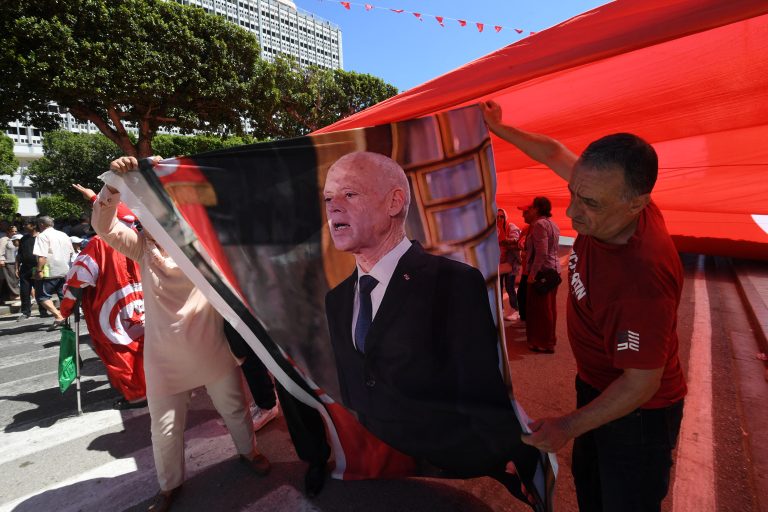Tunisia, once hailed as the standout democratic success of the Arab Spring, now faces a looming threat of authoritarianism. A recent study warns that the nation’s fragile economy may endanger its political progress and return it to authoritarian rule.
As the country approaches its October 2024 elections, analysts caution that President Kaïs Saïed could further consolidate his power, potentially undoing the progress made since the 2011 Jasmine Revolution. But what factors have led Tunisia to this critical point, and how has economic stagnation undermined its democratic development?
The Jasmine Revolution’s Legacy
Tunisia’s democratic journey began in late 2010 when protests against the regime of Zine El Abidine Ben Ali sparked the Jasmine Revolution. This movement triggered the larger Arab Spring, which spread throughout North Africa and the Middle East. While other nations struggled with violent outcomes, Tunisia emerged as a symbol of hope and reform.
In the early years following the revolution, the country underwent significant political reforms. Tunisia’s new democratic framework earned high marks for accountability on the BGI Democratic Accountability Index, as efforts to eliminate past corruption and inefficiencies took shape. By 2021, Tunisia had earned its place as one of the region’s few democracies. However, persistent economic challenges quietly undermined these gains, paving the way for the crisis now at hand.
Economic Woes After the Revolution
Despite democratic advances, Tunisia’s economic woes continued to persist post-revolution. From 2010 onwards, the provision of public services, such as education and healthcare, remained subpar. Stagnant economic growth, increasing unemployment, and rising poverty levels compounded the situation, leading many citizens to leave the country in search of better opportunities.
The Berggruen Governance Index report illustrates the disconnect between Tunisia’s democratic progress and its economic underperformance. While the nation’s political score rose, fiscal capacity and overall economic stability declined sharply. By 2021, it became clear that political reforms had failed to improve the material wellbeing of ordinary Tunisians, and frustrations over the lack of economic progress began to erode trust in democratic institutions.
Governance and External Investment: A Complex Balance
The report, conducted by researchers from UCLA’s Luskin School of Public Affairs, the Berggruen Institute in Los Angeles, and Berlin’s Hertie School, highlights both internal and external factors that have contributed to Tunisia’s economic challenges. Domestically, the government struggled to stabilize the post-revolution economy. Internationally, foreign investment declined as investors became hesitant to engage with Tunisia’s uncertain political landscape. The BGI report indicates that foreign direct investment (FDI), which had reached nearly 9.5% of GDP during Ben Ali’s reign, fell drastically after the revolution, exacerbating the country’s economic instability.
President Kaïs Saïed, a law professor who surged to power in 2019 on a populist platform, initially offered a break from Tunisia’s political elite. However, his actions since taking office have raised concerns about the future of Tunisia’s democracy.
The Slide Towards Authoritarianism
In 2021, Saïed suspended Tunisia’s parliament, a move many observers called an “auto-coup.” The following year, a new constitutional referendum shifted more power to the executive branch, sparking fears of a return to authoritarian governance. Human rights groups have since voiced alarm over increasing repression, including the arrest of opposition figures and violent crackdowns on migrants. The study warns that Tunisia’s democracy is now on the verge of collapse.
With the 2024 elections on the horizon, experts predict that the process may be little more than a formality to legitimise Saïed’s control. According to reports from Human Rights Watch, several opposition figures are barred from running, with one candidate even campaigning from prison.
Economic Isolation and Mounting Discontent
Saïed’s populist rejection of a $2 billion IMF loan in 2023, which he framed as a foreign imposition, further isolated Tunisia economically. Without the loan, the country faces increased financial strain, with rising unemployment, inflation, and food shortages pushing many Tunisians deeper into hardship. This economic crisis, coupled with political repression, suggests a grim outlook for democratic recovery in the near future.
A Broader Warning for Emerging Democracies
The situation in Tunisia provides a critical lesson about the interdependence of political and economic development. According to the Berggruen Governance Index, robust democracies tend to foster economic prosperity. However, Tunisia’s experience shows that democracy alone is not enough to guarantee economic success. The study argues that emerging democracies, especially those in developing countries, often struggle to balance public demand for immediate economic relief with the need for long-term investment and growth.
Tunisia’s economic struggles have directly impacted its citizens. Employment in vulnerable sectors is rising, and levels of undernourishment are climbing back to those seen during the revolution. The economic downturn has fuelled social discontent, and without clear solutions, the country’s stability remains at risk.
Tunisia’s dilemma highlights the broader challenge facing democracies worldwide: the need to deliver both political and economic progress. When democratic governments fail to improve living standards, they risk paving the way for authoritarianism to take hold once again.
